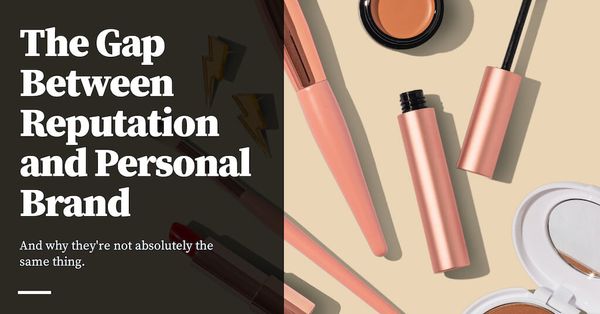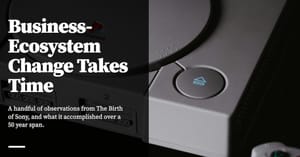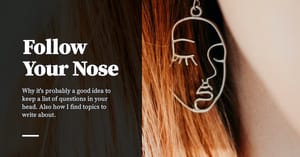Reputation is old. Personal brands are new. It is useful to know that they are not the same thing.
I last talked about personal brands in Personal Brand as Moat, Personal Brand as Soft Landing. One of the things that I alluded to in the piece was the idea that reputation isn’t exactly the same thing as a personal brand. I’ve learnt a couple of things since then.
Personal Brands Are About Projections
Leonard Lauder, the son of Estée Lauder, was one of the first people to grapple with the implications of personal brand building. In his autobiography, he wrote:
In our early years, we couldn’t really afford to buy advertising. We spent our money instead on sampling in the stores, preparing direct mailers to invite charge customers to receive a gift in the store, and sharing the cost of newspaper ads with our retailers. But with my mother on hand, I didn’t have to advertise because she always got the ink.
My idea was to shine the spotlight on her, to make Estée Lauder the person the living, breathing embodiment of the Estée Lauder Company. She would be the Betty Crocker of the beauty business, only unlike the invented character on the box of cake mix, there was a real Estée Lauder behind the Estée Lauder brand.
At the same time, my mother understood the importance of creating a character that was larger than life, so she always dressed well, always made sure to get in front of a camera, always was available for interviews. It’s been said that 80 percent of success is just showing up. My mother was there—100 percent.
Lauder starting doing this in 1958. You can already see the bones of modern personal brand building in his account. The art of turning a person into a brand is essentially the art of building a projection — a model of a person that you want to insert into other people’s heads. Estée Lauder was a real person, of course — an extremely driven entrepreneur, complete with dreams and fears, strengths and weaknesses, virtues and flaws. Earlier in her career, she couldn't bear to have her husband — Leonard’s father — drag her down, and so she divorced him for a number of years. (They did eventually get back together).
To create the brand of Estée Lauder, however, Leonard Lauder reduced her to only the core projection that best served the company’s interests.
And it came with its costs:
I knew there would be a price to pay for encouraging my mother to become an icon: the price would be the emotional relationship between mother and son. Our relationship would evolve into more of a professional partnership, marked by mutual respect, between a star and her impresario.
But one of the fundamental tenets of management is to put people in a role where they can most shine. Because we were a small company, I had to think about how to best allocate our resources. My mother was one of our most valuable assets. I made it my goal to use her at her best.
That meant deliberately stepping out of the limelight and directing the spotlight on her in her role of master of the beauty universe. I would never compete with her for attention. In public, I made a point of never referring to her as “Mom” or even “my mother.” She was “Mrs. Estée Lauder.”
As the company grew, she basked in its success. As for me, I figured that if the company succeeded, I’d succeed, too.
Later, during the Revlon wars, Lauder took the projection and applied it to Karen Graham — the first ‘face of Estée Lauder’. Graham was the first model ever to have a beauty contract; Lauder had single-handedly invented the idea of beauty sponsorships. He transitioned the projection just as Estée stepped back into retirement.
The idea of building a projection on social media isn’t a novel one, by any means — Shawn Wang, whom I consider one of the best personal brand builders in the software world, has this to say in his How To Market Yourself guide:
There are other aspects of my personal brand that don't get as much attention. But I bring it up front and center when it is relevant. I changed careers at 30. I used to be in Finance. I served as a Combat Engineer in the Army. I am from Singapore. I speak Mandarin. I've written production Haskell code. I sing Acapella. I am a humongous Terry Pratchett fan (GNU Terry Pratchett). I love Svelte and React and TypeScript. I am passionate about Frontend/CLI tooling and developer experience. I listen to way too many podcasts. The list goes on.
But I have this list cold. I know exactly what parts of me spark interest and conversation. Therefore I can sustain interest and conversation longer, and people know when to call on me. You should keep a list too - know your strengths and unfair advantages.
What I do NOT consider my personal brand is the stuff that doesn't differentiate me at all. For example, when asked about my hobbies, I deflect extremely quickly. I identify as a "Basic Bro" - I have my PS4, and Nintendo Switch, I like Marvel movies and watch the same Netflix shows you watch. Just like the million other Basic Bros like me.
Totally basic. Totally boring. NOT a personal brand.
And this is very useful to know.
Personal Brands Exist Because We’re All Broadcasters Now
Leonard Lauder — uniquely amongst his generation — had to grapple with the implications of personal brand because his mother created a consumer-facing luxury company. Reading his autobiography is in many ways a history of brand strategy: Lauder was born in 1933, and — unlike the marketers that came after him — had to figure out how branding worked for himself, from scratch. In other words, he made it up as he went along.
Personal brands are more of a thing now because everyone is a broadcaster. Nobody but the Lauders — and a few others: politicians and media celebrities amongst them — had to worry about personal brand building in the decades after World War 2. But those who want to develop an online presence today have to grapple with some of the issues that Lauder faced in the 60s, and that, later, rock stars faced after the creation of MTV.
For the rest of this essay, when I say ‘personal brand’, I mean ‘the projection that you create of yourself in the heads of an audience, through a one-to-many broadcast channel’. There are many definitions of personal brand, but this one is mine.
Reputations and Personal Brands Aren’t The Same Thing
One of the most interesting tensions in this topic is the gap between reputation and personal brand.
I think it’s fairly obvious that while there is large degree of overlap between the two concepts, they aren’t exactly the same thing. Warren Buffett’s dictum of “We can afford to lose money — even a lot of money. But we can’t afford to lose reputation — even a shred of reputation” doesn’t quite have the same ring to it, if you swapped out ‘reputation’ for ‘personal brand’.
The best frame I currently have for thinking about this is that reputation is what other people say about you, while personal brand is what you project about yourself. Ideally, the two are the same. But sometimes, they drift apart.
Here’s an example: I recently discovered that a thought leader I followed on Twitter was somewhat of a dickwad in real life. This was surprising — especially given that said person operated in Silicon Valley, while I lived in Singapore, half a globe away. You would think that reputations stay fairly local; on social media, this person always seemed thoughtful and kind and interesting and insightful. But through a friend who had operated in the Valley, I learnt that they weren't all they were made up to be.
I think we know this instinctively: people can project themselves as kind or thoughtful or smart on a medium that they control. But because careers last four decades on average, and because the number of people you interact with only increases with time, reputations tend to win out.
Must You Build a Personal Brand?
No, of course not. It really depends on what you’re trying to do. I know people with career moats so solid that they can quit their jobs tomorrow and secure an offer with a new company in a week; these people don’t bother with social media. And why should they? If you operate in an industry with a dense reputation network, then you can probably rely on that network for new opportunities, broadcast mediums be damned.
One of the first rules of marketing is that you have to know who you’re selling to, so that you don’t spend resources on channels that aren’t as good. Sometimes, this isn’t so clear. “What if we sponsor a golf tournament?” someone suggests at your weekly marketing meeting, and the answer to that question isn’t necessarily “golf tournaments don’t work!” — they might, for some products! — but instead “historically, the people who buy our boring enterprise software are CTOs, and those nerds don’t hang out at golf tournaments.”
(I stole this example from April Dunford, because she uses it to make this exact point: when you are in an early-stage company, how do you know if one marketing tactic is better than another, before you try it out? How do you win in internal marketing fights? And the answer she gives is simple: start from the customer — who are you trying to target, really? How do they view solutions like yours? And how do they buy stuff? Once you have these answers, everything unfolds naturally: you can ask where they hang out; you can investigate the publications that they read. Marketing debates simply become easier.)
In a career context, a personal brand exists to secure career opportunities. And so you have to ask yourself: are the people who might offer those opportunities on Twitter or Facebook or LinkedIn? For certain careers, that answer is yes; for others, that answer is no. If you attempt to build a personal brand in ML research, for instance, you would very quickly learn that — say, pre-tenure — publication in conferences are the most important thing, followed closely by citation count; no amount of Twitter clout would get you the positions that you desire.
I’ve mentioned that my career moat is my ability to set up and operate engineering offices in uncomfortable South East Asian countries. If I were to look for a job, my target audience would be the founders and operators of SEA tech businesses, particularly those who want to set up regional offices but fear the operational difficulty involved. I could build a personal brand on Twitter to that effect, but I’d get far better results for far less work if I talked about these things within the region’s existing startup networks. (I could also write an article on Tech In Asia, since a good number of founder-operators and their VCs read TIA; my point here is simply that I’m starting with my target ‘customer’ in mind, and writing or speaking where they already hang out).
You can perhaps see why a personal brand isn’t as important for my context. What’s more important is my reputation: if a founder wanted to hire me, they’d likely start asking around — and what my references say about me as an operator are way more important than what I broadcast on LinkedIn.
Don’t get me wrong, though: personal brands are powerful things. Leonard Lauder didn’t turn Estée Lauder into a brand for no reason; together, mother and son built the company into the diversified beauty conglomerate that it is today. Similarly, personal brands can do wonders if they fit into the opportunity sets that you’re seeking. My point is simply to be explicit about this decision: to know why you’re building a personal brand in the first place.
Closing Thoughts
One thing that I’m not so sure about is if personal branding will become a permanent thing — an evolution of the career metagame, if you will. In 1991, Warren Buffett famously warned Salomon’s employees about protecting the reputation of their firm. He said: “Lose money for the firm and I will be understanding. Lose a shred of reputation for the firm, and I will be ruthless.”
It's clear that reputation is a timeless thing. But would we also teach our kids to curate a powerful personal brand, the same way savvy Gen-Zers parlay fame on TikTok and YouTube into fortune elsewhere?
I’m not so sure about this. Then again, I’m probably too old for TikTok. I’ve been digging into brand building and brand history out of curiosity — what did it feel like, creating the brand playbooks that we take for granted today? How much of that experience informs our current moment?
From what I’ve read, I can say only the following with confidence: it is the rare person indeed who can keep a personal brand relevant for longer than a decade. There aren’t many Estées and Madonnas around, after all. And I think it is easy to grok why: personal brand building takes continued effort, whereas reputation is simply the result of our actions over a long period of time.
Originally published , last updated .





